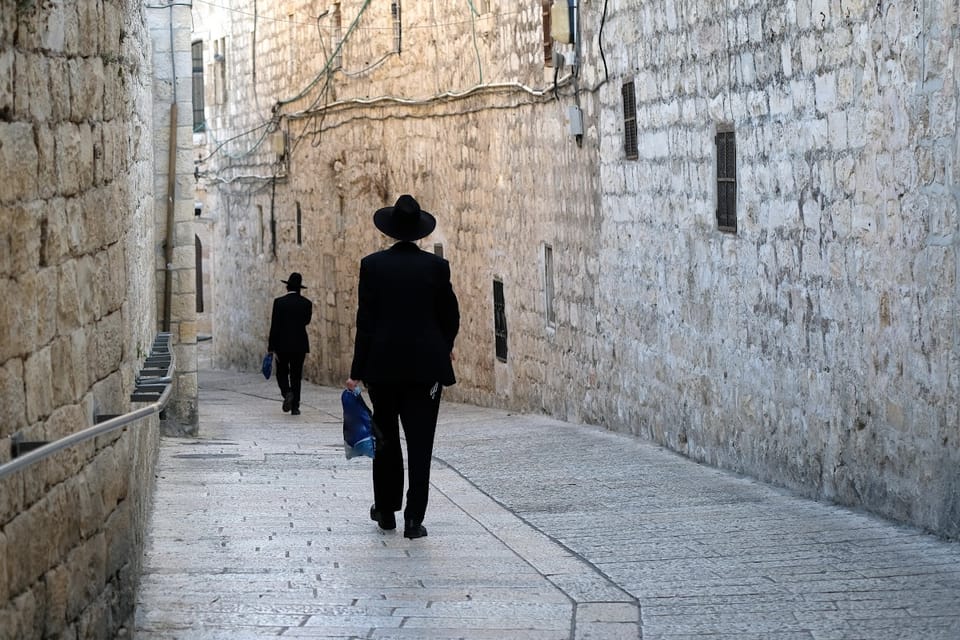Why Do Charedi Men Wear Black and White?

Is it just tradition, or is there something deeper behind the dress code?
The choice of black and white clothing among Charedi men is not merely a cultural custom—it reflects deep spiritual principles rooted in humility, identity, and the pursuit of timeless truth.
1. Clothing as a Reflection of the Soul
In Torah thought, clothing (begadim) is never just physical. The Torah places great emphasis on garments—from the Bigdei Kehunah (priestly garments) in the Beis HaMikdash, to the laws of shatnez, to the mitzvah of wearing tzitzis. Chazal explain that what we wear affects not only how others see us—but how we see ourselves.
Rav Yitzchok Hutner zt”l taught that clothing serves as the interface between a person's pnimiyus (inner essence) and the outer world. Just as a Sefer Torah is clothed in a mantel to reflect its dignity, so too, the Jew’s external appearance should reflect a life dedicated to avodas Hashem.
2. Black and White: Humility and Clarity
Black is a color of anavah—humility. It avoids drawing attention, rejecting the colorful patterns and changing styles of secular fashion. White represents tohar—purity and spiritual aspiration. Together, black and white express the ideals of the Torah Jew: lowliness before Hashem, and a yearning for clarity and truth.
The Beis Yosef brings in the Tur (Yoreh De’ah 178) that some garments are worn as a form of pride, while others are signs of humility. Rav Moshe Feinstein zt”l explained that the black garb of bnei Torah serves as a statement: “I am not chasing after style or the vanities of the world.”
3. Separateness from the Nations
The Torah commands us: "וְהִבְדַּלְתֶּם מִן־הָעַמִּים לִהְיוֹת לִי" “And you shall separate yourselves from the nations to be Mine.” — Vayikra 20:26
Dress is one of the clearest ways a nation expresses its values. Just as the nations have their styles and symbols, the Charedi community—especially its men—choose to visibly express their loyalty to Torah and to mesorah through a distinct, dignified appearance.
The Ramban on this pasuk emphasizes that separation from non-Jewish practices is a path to kedushah. By not participating in the ever-changing world of fashion, Charedim maintain a conscious barrier between their identity and the secular world.
4. Following the Mesorah of Gedolim
Charedim don’t invent new styles. They preserve the path of our Gedolei Yisrael, who for generations wore black hats, black jackets, white shirts, and simple shoes. From Rav Chaim Ozer Grodzinski zt”l, to the Chazon Ish, to Rav Shach zt”l, our leaders dressed this way—not because it was trendy, but because it was dignified and neutral, the clothing of bnei Torah.
The Steipler Gaon zt”l once said: *“A yeshiva bochur should look like a ben Torah wherever he is. If you dress like a ben Torah, you’ll act like one.”*¹
5. Avoiding Fashion’s Trap
Modern fashion thrives on self-expression, materialism, and ego. The Torah view, by contrast, is that true individuality is expressed through middos tovos, learning, and inner growth—not by flashy outfits.
The Vilna Gaon writes in Even Sheleimah (11:7) that one of the tests before Moshiach will be a world driven by superficiality and external image. The Charedi choice of black and white is a quiet rebellion against that world.
6. A Daily Reminder of Purpose
A Charedi man wears black and white every day—not just on Shabbos or Yom Tov. Why? Because every day is a day of avodas Hashem. The black jacket is like the bigdei kodesh of a kohen. The white shirt is a reminder of what we strive to be: clean, clear, and close to Hashem.
As Rav Matisyahu Solomon shlita said: “A ben Torah doesn’t ask, ‘What do I feel like wearing today?’ He asks, ‘What will help me remember who I am today?’”
Conclusion: Simplicity That Elevates
Wearing black and white is not a rejection of beauty—it is a commitment to timeless beauty, rooted in Torah values. It reflects seriousness, dignity, humility, and the eternal bond between the Jew and his Creator.
It is the uniform of those who serve the King.
Sources:
- Rav Yaakov Yisrael Kanievsky (Steipler), Karyana D’Igarta, Vol. 1 Letter 23
- Ramban on Vayikra 20:26
- Tur Yoreh De’ah 178; Beis Yosef commentary
- Rav Moshe Feinstein, Igros Moshe, Yoreh De’ah 1:81
- Vilna Gaon, Even Sheleimah 11:7
- Rav Matisyahu Solomon, Matnas Chaim on Middos
